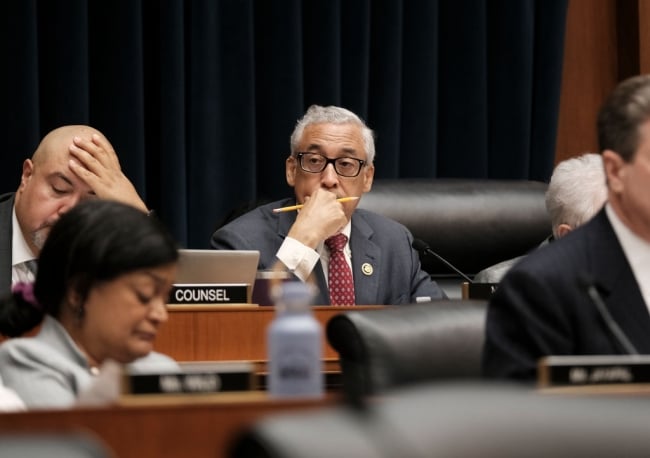You have /5 articles left.
Sign up for a free account or log in.

Bobby Scott, ranking Democrat on the House education committee, stridently opposed the FAFSA deadline bill but failed to unite his party colleagues behind him.
Michael A. McCoy/Getty Images
The House Education and Workforce Committee moved legislation forward on Wednesday that would cement Oct. 1 as the official deadline for launching the Free Application for Federal Student Aid, this year and in perpetuity.
Currently, Oct. 1 is only the recommended launch date, giving the Education Department flexibility to release the FAFSA anytime before the end of a calendar year if circumstances require—as it did last year, when the department’s congressionally mandated overhaul of the form led to months of delays and a raft of errors and technical problems that upended the financial aid cycle for students and colleges.
The FAFSA Deadline Act was introduced by Representative Erin Houchin of Indiana and championed by her Republican colleagues on the committee, who have hammered the Biden administration for its bungled rollout of the new FAFSA for months.
“I'm especially frustrated considering the Department of Education had three years to simplify FAFSA as Congress directed. However, instead, Secretary Cardona and President Biden chose to focus their time and efforts on an illegal student loan forgiveness scheme,” Houchin said, referring to the Biden administration’s student debt repayment programs, which many right-wing lawmakers blamed for the FAFSA debacle.
Virginia Foxx, the North Carolina Republican representative who chairs the committee, said the measure was needed because the Education Department “has demonstrated it has learned little from last year’s disaster.”
Education Secretary Miguel Cardona, she said, “has hedged and said Oct. 1 is only an ‘expected’ goal, which is far from the solid commitment that students deserve,” Foxx said during Wednesday’s markup. “By establishing a hard deadline, [the FAFSA Deadline Act] will provide students, families and schools with much-needed clarity and stability.”
The department said the mandate would do nothing to help ensure a smooth and timely rollout. “Our top priority remains delivering a Better FAFSA and improved application experience for the next FAFSA cycle,” a spokesperson wrote in an email to Inside Higher Ed. “To impose a legislative deadline without providing the additional resources or support needed to launch is simply a political stunt.”
Department officials have signaled their intentions to meet the deadline, however, with or without a legislative mandate: to expedite the process, they’ve suspended their usual 90-day public comment period on a FAFSA draft and hired outside help from the nonprofit College Board, among other technical ground-laying measures.
Lawmakers and higher ed leaders alike are skeptical that those efforts will mean the form will be working by Oct. 1, though, and fear a repeat of this January’s soft launch, when the new FAFSA was technically available—to meet the existing congressional deadline—but functionally inoperable for weeks, with errors that stretched into May.
That doesn’t necessarily mean that an imposed Oct. 1 deadline is the solution, however. “I would much rather that the FAFSA be ready without errors and with full capability on Nov. 1 or Dec. 1—or even Dec. 10—than have it roll out in October full of problems,” Rachelle Feldman, vice provost for enrollment at the University of North Carolina at Chapel Hill, told Inside Higher Ed last month.
The legislation was opposed on those lines by some of the committee’s highest-ranking Democrats, including ranking member Bobby Scott of Virginia, who offered a scathing critique of the “arbitrary, accelerated deadline” in his opening remarks.
“We all want FAFSA to work,” he said. “However, I doubt that the conditions imposed on the department by [the bill] will do anything to improve the situation. It may, in fact, make matters worse … Speed should not come at the expense of accuracy.”
But the Democrats, unlike the Republicans, were divided on the issue. While a few, including Representative Jahana Hayes of Connecticut, joined Scott in opposition, others came out in support of the amendment, arguing that this past year’s rollout debacle necessitated harsh measures to ensure accountability from the department.
“Even though I cannot say I concur with the gentlewoman from Indiana's disparaging remarks concerning Secretary Cardona and the president, I think everyone here can agree that the rollout of the new simplified FAFSA did not go as intended,” said Representative Lucy McBath of Georgia. “Officially moving the FAFSA deadline from January to October … is a very tangible way that we can ensure that nothing like this ever, ever happens again.”
The majority of the 20 Democrats on the committee ultimately voted to support the Republican proposal, which passed 34 to 6.
Splitting the Vote
The FAFSA Deadline Act has a long way to go before becoming law. It must next pass the full House before being considered by the majority- Democratic Senate. But the House committee Democrats’ lack of unified opposition could be a glimpse of its potential for broad support.
“I’m really quite torn on this,” North Carolina representative Alma Adams said at Wednesday's hearing. “While I think that giving [the department] extra time might be helpful in some cases, I do believe that extending [the deadline] well into the next school year might be a bit problematic.”
Congressional Democrats aren’t the only group divided by the bill. Some higher education lobbying organizations, like the Association of Public and Land-grant Universities, support the measure. But others say now is the worst time to institute a strict timeline for the Education Department, as it struggles to right the FAFSA ship.
“Codifying the Oct. 1 FAFSA launch date into law has been a top priority for NASFAA for many years,” said Karen McCarthy, vice president of public policy and government relations at the National Association of Student Financial Aid Administrators, in a statement. “However, in the absence of a clear timeline or understanding from the Department of Education about when the entire FAFSA system will be available … forcing an Oct. 1 deadline this year does not guarantee a fully functioning form, and may in fact work against efforts to release a product that has been tested and found to run smoothly. We need all stakeholders to work together in good faith to ensure this year’s mistakes are not repeated.”
The committee approved an amendment, introduced by GOP representative Bob Good of Virginia, which would require the education secretary to certify that it is on track to meet the Oct. 1 deadline one month in advance—and to testify before the committee if it cannot. The amendment received more support from Democrats, including Scott.
“Although I have serious concerns with mandating a hard deadline for this year’s FAFSA, I do believe it’s important to provide as much transparency as possible for students, families and colleges,” Scott said. Good’s amendment “gives the committee the opportunity to intervene and offer some assistance before it’s too late.”
Still, Scott said he did not believe the FAFSA Deadline Act was introduced in good faith—especially as House Republicans have moved to slash funding to the Office of Federal Student Aid.
“This legislation would do nothing to actually fix FAFSA or help students,” Scott said, “but would set the department up for failure just to potentially score some political points.”









